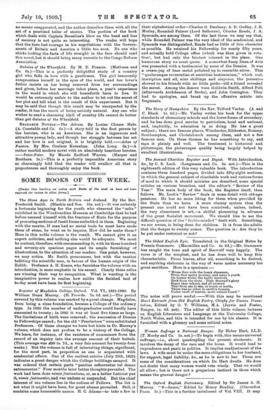Register of Magdalen College, Oxford. Vol VI., 1821 - 1880. By William
Dunn Macray. (H. Frowde. Is. 6d. net.)—The period covered by this volume was marked by a great change. Magdalen, from being a close foundation, became a College of the ordinary type. In 1820 the number of undergraduates could hardly have amounted to twenty ; in 1880 it was at least five times as large. The limitations of birth were removed ; the succession of Demies to Fellowships ceased ; for the old " Praelectors" were substituted Professors.. Of these changes we have but hints in Dr. Macray's volume, which does not profess to be a history of the College. We learn, for instance, of the existence of commoners from the record of an inquiry into the average amount of their battels. (This average was .€99 5s. 7d., a very fair amount for twenty-four weeks.) But the volume is full of interesting things, significant, for the most part, in proportion as one is acquainted with academical affairs. One of the earliest entries (July 25th. 1822) indicates a .great danger which the College buildings escaped. It was ordered that certain parts " penitus reficerentur vel denuo extruerentur." Four months later better thoughts prevailed. The work had been done nitnia festinatione, or, as a better Latinist put it, Minis festinanter, and was undone or suspended. But the chief interest of the volume lies in the notices of Fellows. The list is not what it might have been, for great abuses prevailed. Still, it contains some honourable names. H. C. Adams—to take a few in their alphabetical order—Charles G. Daubeny, A. D. Godley, J. B. Mozley, Roundell Palmer (Lord Selborne), Charles Reade, J. A. Symonds, are among them. Of the last three we may say that, while Roundell Palmer was the very ideal of the academical, and Symonds was distinguished, Reade had as little of this character as possible. He retained his Fellowship for nearly fifty years, and actually held College office (which was then given in rota- tion", but had only the faintest interest in the place. One humorous story we must quote. A somewhat fussy Dean of Arts was presented with a testimonial by some of the Demise. It was a cream-jug of base metal polished. up to resemble silver. This " qualecunque reverentiae et amicitiae testimonium," which cost, inscription and all, nine shillings and sixpence, the presentee showed to his friends with no little pride—till a friend revealed the secret. Among the donors were Goldwin Smith, Alfred Pott (afterwards Archdeacon of Berke), and John Conington. They had to apologise, and break up the offensive article into fragments.










































 Previous page
Previous page